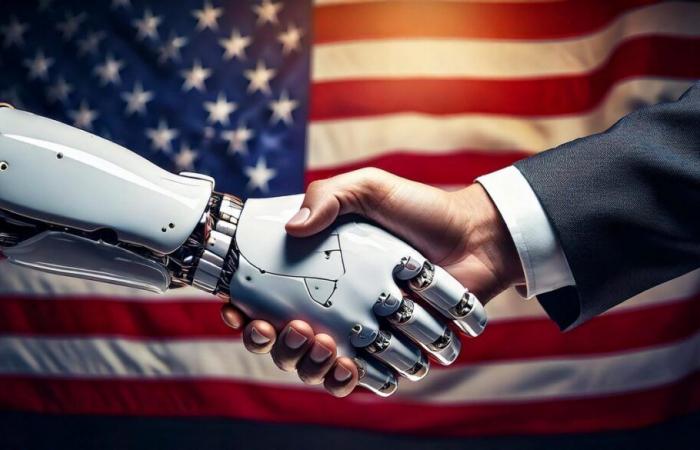Between deregulation of AI, relaxation of rules on cryptocurrencies and tension with the EU, the re-election of Donald Trump as president of the United States could shake up the global technological ecosystem.
Donald Trump has just been elected 47e president of the United States. During his campaign, the ex-president focused on freeing the US technology industry from overregulation and reducing Chinese influence in the global market. But what will really be the impact of such a victory on technology companies, innovation and regulation?
A change of direction on AI regulation
Regulating artificial intelligence (AI) should be a priority under the Trump administration. Unlike Joe Biden’s more restrictive approach, which imposes more limits to protect users’ rights and ensure content moderation, Trump envisions a more liberal environment. Biden’s AI regulations “harm” American innovation and favor China, he said. For Trump, the solution would be to repeal the decrees of the outgoing president and put in place less restrictive regulations, based on freedom of expression and the promotion of “human flourishing”.
This vision could mark a turning point for technology companies, particularly in the AI sector, which could see their operations less hampered by rules deemed too restrictive. A strategy that could further widen the gap between American companies and European companies, forced to respect several regulations, such as the GDPR and the AI Act.
Also read:
A more liberal approach to cryptocurrencies
Donald Trump has also shown a more flexible approach to cryptocurrencies. Convinced that overly strict regulations risk slowing down innovation and driving businesses away to other regions, Trump could offer a more favorable environment for digital assets. His goal? Make the United States an attractive hub for companies in the sector.
Although his proposals remain vague, the objective would be to minimize state intervention, even if it means leaving aside protections for consumers and the financial system. This type of approach could accelerate the development of cryptocurrencies but also entail risks for uninformed investors.
Following the first election results, the value of bitcoin and other cryptocurrencies, such as Ether, soared overnight from Tuesday to Wednesday.
A reduction in regulation to encourage innovation, but at what cost?
One of Trump’s campaign promises is to free the technology industry from the burden of government regulation, believing that innovation should thrive in an environment where businesses have more freedom. However, such deregulation could also expose users to more risks, whether from data security or excessive surveillance. Some companies, such as Apple, Google and Amazon, have already engaged in discussions with Trump to explore how his proposals could influence privacy and cybersecurity regulations.
Previously at odds with Silicon Valley – the tech community, considered progressive, has always been supportive of the Democratic camp – the new president received the support of several big bosses in the industry through America Pac, a fundraising organization. to support his candidacy with millions of dollars.
Growing tensions with the EU
International relations will also be affected by a Trump victory, particularly regarding American tech giants and their interactions with the European Union. The EU has stepped up pressure on companies like Google, Apple and Meta with new regulations on competition and market domination, threatening heavy fines and sanctions. Trump could take a more combative stance toward the EU, seeking to counter what he might perceive as European interference in the affairs of American companies.
The impact on semiconductor supply and production
One of the most direct consequences of a Trump re-election would be the intensification of the trade war with China, an already central theme during his presidency. Trump has expressed his intention to impose tariffs on many Chinese products, including semiconductors and electronic goods. This could disrupt companies like Apple and Amazon that rely on Chinese production for some of their products.
Cybersecurity under close surveillance?
Cybersecurity could also evolve under Trump, although the details of his policy remain unclear. On the one hand, Trump could take a more muscular stance on cybersecurity, including requiring companies to report data breaches to the government more quickly. On the other hand, its “America First” rhetoric and its sometimes tense relations with its allies risk hindering international cooperation in the field of cybersecurity. Such a policy could weaken the United States’ ability to address global threats while increasing risks for American businesses.
Conquering Mars
Donald Trump’s victory is good news for billionaire Elon Musk, the boss of Tesla, X and SpaceX and fervent support of the new president. He will thus be able to carry out his plans to “conquer” the planet Mars. Its intention is to send unmanned spacecraft to the Red Planet from 2026 and manned missions from 2028 via its company SpaceX.
In the long term, Elon Musk plans to settle a million Earthlings on Mars in the next 20 years through his company. According to the New York Times, its teams are already working on the design of habitable domes, space suits and studying the possibility of procreation outside Earth. Musk, whose fortune funds this project, imagines an autonomous city powered by resources like Tesla’s solar panels and drilling technologies developed by The Boring Company. The election of Donald Trump will allow him to accelerate his timetable for establishing a Martian civilization, inspired by science fiction and driven by the conviction that Mars could “save humanity” in the event of a crisis on Earth. Maybe this is already the case?
Opening photo generated with AI






